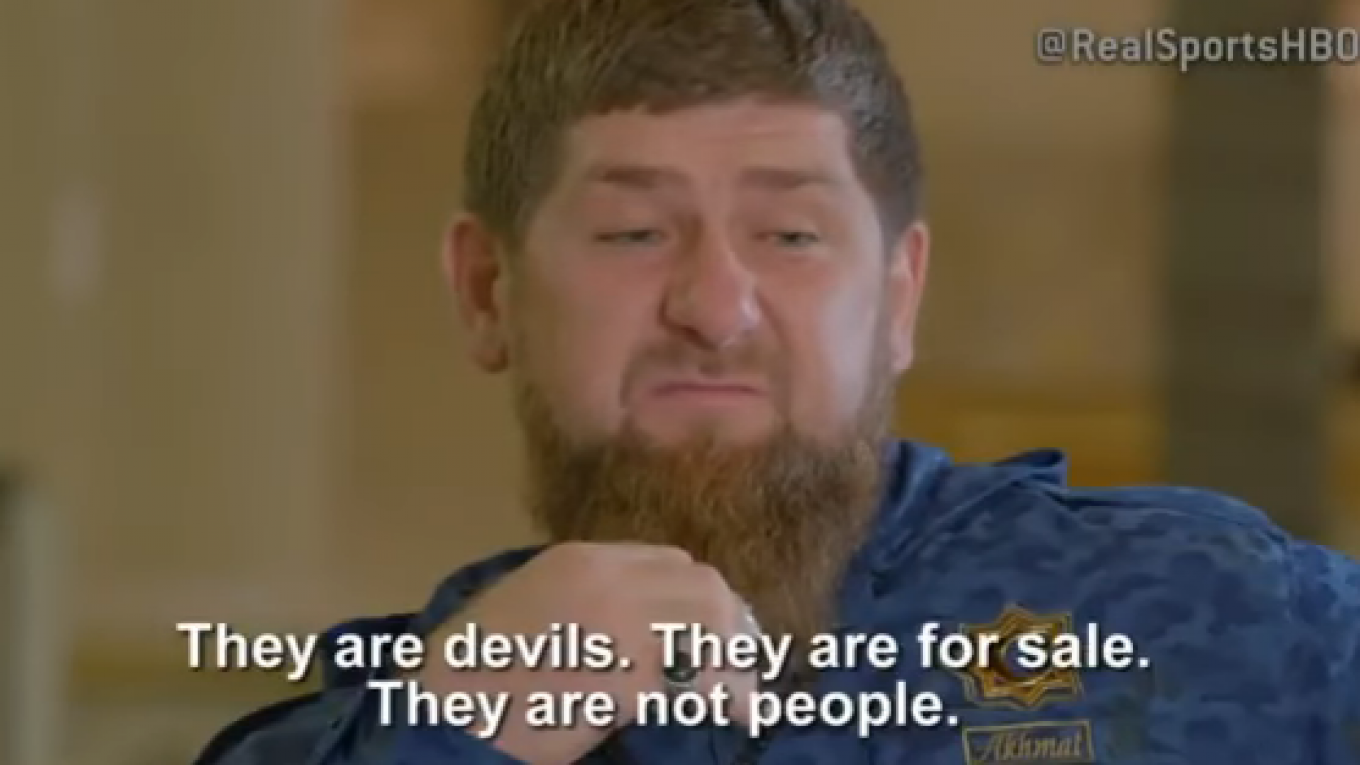In his recent interview with the U.S. cable network HBO, Chechnya’s strongman Ramzan Kadyrov dismissed the anti-gay-purge allegations as nonsense, denied the very existence of gay people in this southern Russian region with a population of over one million, and candidly promised to “put the whole world on its knees and screw it from behind.”
His brazen comments may have shocked international audiences, but the Kremlin’s spokesman, Dmitry Peskov, told journalists on July 17 that “nothing out of the ordinary has been said.”
Sadly, Peskov is right — Kadyrov has been making outrageous, despicable statements for years, and this one is not much different. Kadyrov is known to publicly condone honor killings, order house-burnings, and openly threaten Russian pro-democracy politicians, journalists, and human rights defenders. Some of those threatened were later killed, and there has been no justice for these murders.
A Long History
July 15 was the eighth anniversary of the chilling murder of Natalia Estemirova, a courageous Chechen activist and journalist, and my dear friend. The investigation into her murder stalled long ago, though there are very strong grounds to suspect the involvement of Chechen security officials under Kadyrov’s control.
Just a few days ago, a court in Moscow ruled on the murder case of Boris Nemtsov, the prominent opposition leader and former deputy prime minister of Russia brazenly killed just outside the Kremlin's walls 2.5 years ago. Five defendants, all of them of Chechen origin, received long prison sentences, but the masterminds have gone unmentioned and unpunished.
The scandalous large scale “cleansing” operation against gay people in Chechnya, which has not faded from international headlines, was launched by Chechen authorities in the last week of February this year. It went on for about six weeks with a brief lull in mid-March.
During that time, local security officials rounded up dozens of men on suspicion of being gay, held them in secret detention for days, humiliated, starved, and tortured them. Most returned home barely alive from beatings and electrocutions. Their captors exposed them to their families as gay and encouraged their relatives to carry out honor killings.
About 60 victims and people otherwise affected by the purge have fled Chechnya with the assistance of the Russian LGBT Network NGO. Some of them have found safety abroad. Others are hiding in not-so-safe houses in central Russia. Human Rights Watch, other rights groups, and international journalists interviewed numerous former detainees. Their powerful and consistent testimonies leave no doubt as to the veracity of the allegations.
Reports of the anti-gay purge have caused public outrage across the world. Protest rallies were held in several major capitals. German Chancellor Angela Merkel personally raised the issue with President Vladimir Putin.The foreign ministers of France, Germany, the Netherlands, the UK, and Sweden sent a joint letter to Russia’s foreign minister urging the Russian government to ensure an effective investigation into the allegations.
The Kremlin has not seen such outcry on Chechnya for many years and the pressure has clearly worked.
The Kremlin has not seen such outcry on Chechnya for many years and the pressure has clearly worked. The Kremlin moved from shrugging off the allegations and suggesting that victims file official complaints to opening a federal investigation. President Putin discussed the situation with Kadyrov and later, in an unprecedented move, pledged to speak with the prosecutor general and interior minister about the allegations.
Though no such thing has been admitted by either Russian or Chechen officials in the public domain, it’s clear that as a result of the unprecedented international outcry, the Kremlin instructed Chechnya’s leadership to call off the purge.
The round-ups of gays apparently stopped by mid-spring, and meanwhile Kadyrov and other Chechen officials continue to deny the allegations, repeating time and time again that no such thing could possibly happen in a place where there are no gay men and that honor killings were an appropriate answer to the gay problem had it only existed.
In his HBO interview Kadyrov speaks, among other things, of the need to “purify our [Chechen society’s] blood” from gay people and urges the journalists to “take them” far away “if there are any.”
This sends a clear message to Chechnya’s already terrified LGBT community: hide, flee, don’t dare make a sound; the large-scale purge may be over, but you’ll never be safe.
The message is chilling but no more so than Kadyrov’s previous comments on the issue, for which Russia’s leadership has never called him to task, never publicly expressed even the slightest concern.
Ramzan Kadyrov has been running Chechnya with brutal repression for over a decade. With the tacit blessing of the Kremlin, he gradually built a tyranny there, ruthlessly eradicating even the mildest forms of dissent. Law enforcement and security agencies under his de facto control have systematically engaged in abduction-style detentions, enforced disappearances, torture, extrajudicial executions, and collective punishment.
For years, the targets of these abuses have been various groups deemed “undesirable,” from suspected insurgent sympathizers and Salafi Muslims, to local dissidents, and recently gay people.
If Russia’s international interlocutors really want to see a change in the Kremlin’s Chechnya policy and are not willing to tolerate Kadyrov’s vile threats, they cannot afford to let the matter drop. They should make clear to Russia’s leadership that Kadyrov’s latest repellent remarks cannot be written off as “nothing out of the ordinary.”
They should also inquire about the progress made by federal investigators and demand full accountability of the anti-gay purge and other abuses by Chechen authorities.
A lack of reaction by Western democracies would, on the other hand, only show Moscow and Grozny that their understanding of “ordinary” and “out of the ordinary” is not much different from that of the Kremlin’s spokesman.
Tanya Lokshina is Russia program director at Human Rights Watch
The views and opinions expressed in opinion pieces do not necessarily reflect the position of The Moscow Times.
A Message from The Moscow Times:
Dear readers,
We are facing unprecedented challenges. Russia's Prosecutor General's Office has designated The Moscow Times as an "undesirable" organization, criminalizing our work and putting our staff at risk of prosecution. This follows our earlier unjust labeling as a "foreign agent."
These actions are direct attempts to silence independent journalism in Russia. The authorities claim our work "discredits the decisions of the Russian leadership." We see things differently: we strive to provide accurate, unbiased reporting on Russia.
We, the journalists of The Moscow Times, refuse to be silenced. But to continue our work, we need your help.
Your support, no matter how small, makes a world of difference. If you can, please support us monthly starting from just $2. It's quick to set up, and every contribution makes a significant impact.
By supporting The Moscow Times, you're defending open, independent journalism in the face of repression. Thank you for standing with us.
Remind me later.








